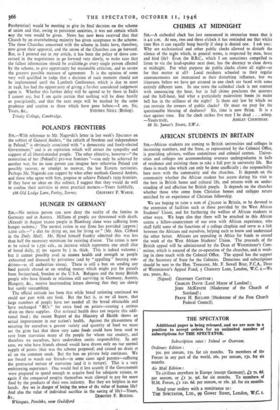HUNGER IN GERMANY
Snt,—No serious person can now deny the reality of the famine in Germany and in Austria., Millions of people are threatened with death. (Already in August ro,000 people in Hamburg alone were suffering from hunger oedema.) The normal ration in our Zone has provided (approx.) ',boo cals.—" a diet for dying on, not for living on" (Mr. Alex. Clifford in the Daily Mai!). Mr. Hynd himself frankly admitted this was less than half the necessary minimum for resisting disease. The ration is now to be raised to 1,55o cals., an increase which represents one small slice of bread daily, 3-} ins square by in. thick. This is indeed welcome ; but it cannot possibly avail to restore health and strength to people exhausted and diseased by privations (and by " appalling " housing con- ditions—as all authorities stress). There is still a ban on sending any food parcels abroad or on sending money which might pay for parcels from Switzerland, Sweden or the U.SA. Refugees and the many British people who have friends or relations still surviving in Germany, Austria, Hungary, &c., receive heartrending letters showing that they are slowly but surely succumbing.
The official attitude has been that while bread rationing continued we could not part with any food. But the fact is, as we all know, that large numbers of people have not needed all the bread obtainable and have exchanged " BUs " for extra food on points—causing a serious drain on these supplies. Our national health does not require this addi- tional food ; the recent Report of the Ministry of Health shows an actual improvement in our nation's health. Against the pleasantness of securing for ourselves -a greater variety and quantity of food we must set the grim fact that these very same foods could have been used to save from starvation many of the people for whom our country, and therefore we ourselves, have undertaken entire responsibility. In any case, we who have friends abroad would have drawn only on our normal supply of points (that was the scheme proposed) and caused no drain at all on the common stock. But the ban on private help continues. We are forced to watch our friends—in some cases aged parents—suffering the protracted torture of starvation (and it is torture). This is a very embittering experience. One would feel it less acutely if the Government were prepared to spend enough to acquire food for adequate rations, or again if the conquered peoples themselves were allowf el to pay for more food by the products of their own industry. But they are helpless in our hands. Are we in danger of losing the senie of the value of human life? And also the value of individual sacrifice in the saving of life?—Yours,






























 Previous page
Previous page